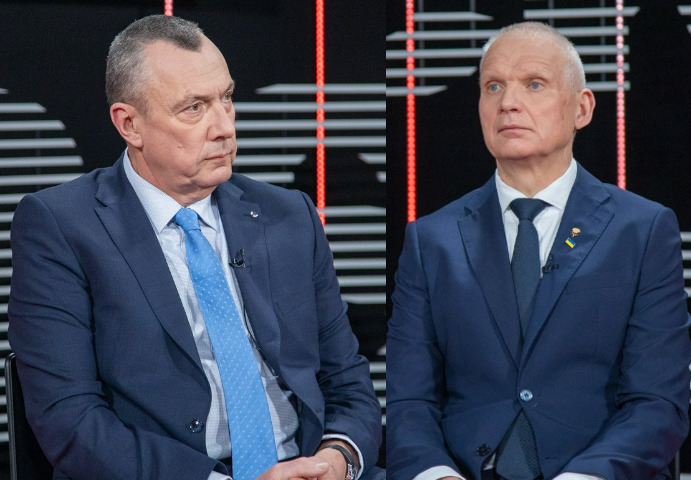That was the essence of claims made on Latvian Television's 'Kas Notiek Latvijā?' (What's Happening in Latvia?) on February 1.
In December, the IOC said it was "in a grave dilemma" about whether to allow Russian and Belarusian athletes to participate in Olympic competition and that "participation in sports competitions must be based exclusively on the sporting merits of an athlete and respect for the rules of sport," citing a letter from its own Special Rapporteur expressing “serious concern about the recommendation to ban Russian and Belarusian athletes and officials such as judges from international competitions, based solely on their nationality, as a matter of principle. This raises serious issues of non-discrimination.”
The IOC promised "further exploration... concerning the participation of athletes who are in full respect of the Olympic Charter and the sanctions. This initiative to be discussed in the next round of IOC consultation calls with the IOC Members, the athletes’ representatives, the International Federations and the National Olympic Committees."
Subsequently a statement published by the IOC on January 25 states that consultations were indeed held with representatives of sports organizations and athletes, and "the vast majority" agreed that the participation of Russian and Belarusian athletes should be further explored.
"No athlete should be prevented from competing just because of their passport," the IOC account says, adding that "A pathway for athletes’ participation in competition under strict conditions should therefore be further explored."
"The vast majority in each of the consultation meetings requested the IOC to continue the exploration of the above-mentioned concept," the IOC claimed.
However Latvian athletes and representatives of various sports organizations on the February 1 program "What will happen to Russian and Belarusian athletes in the Olympics and other competitions?" testified unanimously that the IOC's communications were far from open discussions and that relatively few countries actually had an opportunity to express their positions, rendering talk of "the vast majority" highly questionable.
One of the consultations was with the national Olympic committees, of which there are 206 in total. Žoržs Tikmers, president of the Latvian Olympic Committee (LOK), told the program that in the consultation, which lasted a little more than an hour in remote mode, there was an opportunity to express an opinion – but on a document that no one had seen before.
"There was an opportunity to express an opinion, but the draft of the document itself or the subject to be discussed was not offered," Tikmers said. Asked if the document was seen only after it was made public, the head of the LOK answered in the affirmative.
On the other hand, in response to the question about the consent of the 'majority' claimed by the IOC, LOK General Secretary Kārlis Lejnieks suggested that the IOC was "playing with the facts". Specifically, only twelve Olympic committees had the opportunity to express themselves in such a limited time. From Europe, it was Denmark and Great Britain who stood against the participation of Russian and Belarusian athletes in the Games, while some African and Asian countries, which managed to express themselves, allowed the possibility of such a discussion.
"It cannot be accepted as a fact that the countries that do not speak out automatically accept this document, which did not exist, this is playing with the facts," said Lejnieks, once again emphasizing the brevity of the conversation.
Einars Fogelis, president of the Council of Latvian Sports Federations, and president of the International Luge Sports Federation described conversation with the IOC as more of an informational meeting and less of a discussion on the merits of the matter. "What was said from my colleagues in the winter federations, was that at this moment we do not see such an opportunity. That is what we entered this dialogue with," Fogelis said.
The LOK Athletes' Commission sent a letter before the conversation with the IOC, expressing objections to the participation of athletes from Russia and Belarus in the Olympic Games in Paris. The head of the commission and Olympian Gunta Vaičule said that in the remote talks in which kayaker Roberts Akmens also participated, few countries expressed a strong stance against the participation of athletes from Russia and Belarus. However, she assumed that it was because the information about such a decision of the IOC was presented as already decided.
"The tone in which Thomas Bach spoke made it clear that the decision had already been made," Vaičule said.
The Latvian Bobsleigh and Skeleton Federation has been talking to its international federation and federations of other countries since the spring, urging them not to allow Russian athletes to compete. "And that's what we achieved at the congress," said Zintis Ekmanis, general secretary of the federation. Regarding the IOC's methods, Ekmanis described them as "pressure and manipulation".
As previously reported, the LOK issued an official statement on Wednesday calling the participation of Latvian athletes and representatives of the sports industry in international competitions and events involving Russian and Belarusian athletes unacceptable. Pressure is now building on both the IOC and on France as the host of the 2024 Games, to take a similarly principled stand.
I thank 🇪🇪, 🇱🇻, 🇱🇹 & 🇵🇱 for the principled position. The IOC's attempt to return athletes from RF & Belarus to the Olympics is a legitimization of the criminal aggression against 🇺🇦. We won't allow sport to be used against humanity & for war propaganda!
— Володимир Зеленський (@ZelenskyyUa) February 2, 2023
➡️https://t.co/YSKiagTQEF



























